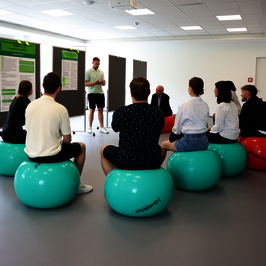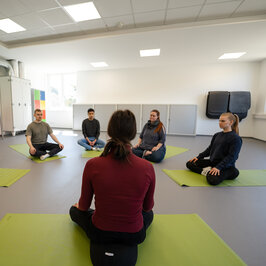What keeps people healthy?
How should working conditions be designed to keep employees healthy and motivated for decades? What opportunities does digitalisation offer for health promotion? What can be done to improve medical care in rural areas? If you find these questions interesting, our master's degree in Applied Health Promotion is the right course for you.
Programme content and structure
Future-oriented content
Health promotion aims to strengthen people's health resources and reduce existing burdens. The focus here is on the various factors that influence health. Social, economic and physical environmental conditions are among the relevant determinants, alongside individual lifestyle factors. By studying with us, you will learn to develop, implement and evaluate needs-based and evidence-based concepts for individual and setting-related health promotion, or to optimise existing ones. The master's degree in Applied Health Promotion deals with health-related topics at a regional and global level. It also examines the healthcare system with all stakeholders involved.
Projects and electives
In the first and second semesters, the research project and a compulsory elective module give you the opportunity to work on very practical issues in line with your interests. The Research Project module, gives you the opportunity to work on a specific question over two semesters, often in cooperation with one of our many practice partners – ideal preparation for future professional activities and just one example of practical transfer during the course.
Entry requirements
AGF specifics
Where theory becomes practice
We have very well-equipped laboratories and practical rooms on our campus in Furtwangen. The Future Care Lab focuses on the development of technical assistance systems, and in the Multi-professional Skills Lab, for example, we have an exercise room, a teaching kitchen, a hospital room and a nursing room. Sounds good? Then come and join us!
What's covered
AGF Study and Examinations Regulations (SPO)
- Download file:General Master SPO
- Download file:AGF SPO
- Download file:AGF Admission Regulations
- Download file:AGF Module handbook
Our electives
Special features
The study programme that suits your life circumstances
Flexible Master's degree
Studying is a full-time job - normally. Our master's degree programme can also be studied part-time and thus offers a flexible model that fits into different life phases and situations! The course is organised in a different way and stretched out accordingly. Whether you are working, raising children or cannot study full-time for other reasons – we are happy to advise you!
Your career prospects
With a degree in Applied Health Promotion, you can comfortably take on specialist and management roles in authorities and organisations (e.g., health insurance companies or associations), in occupational health management (OHM) in companies, in educational and research institutions, as well as in the planning of individual health promotion measures in the private sector and in small and medium-sized organisations.
- in the occupational health management of companies (BGM)
- in health advice/health education, e.g., at municipal advice centres or health insurance companies
- in quality assurance in the healthcare sector, e.g., for healthcare institutions and social insurance providers
- in health promotion, e.g., for health authorities, associations or other municipal organisations
- in project management, e.g., for health insurance companies or healthcare facilities such as hospitals and care centres
- in health science research and teaching, e.g., in universities or research institutes
One example from professional practice

"My responsibilities as a project manager in the Integrated Care Department at Gesundes Kinzigtal GmbH are quite varied. In addition to active project management in various research projects, I'm also responsible for acquiring new projects and quality management, and I'm involved in marketing. I organise events and drive digitalisation forward at our company. At the same time, I have the opportunity to develop my skills continuously, for example by attending conferences and training courses."
Nathalie Haas, Applied Health Promotion graduate
Hi, I'm Janine and I'm taking a master's degree in AGF. I previously studied Applied Health Sciences at HFU. Please get in touch if you have any questions at studienbotschafter-agf@hs-furtwangen.de.








